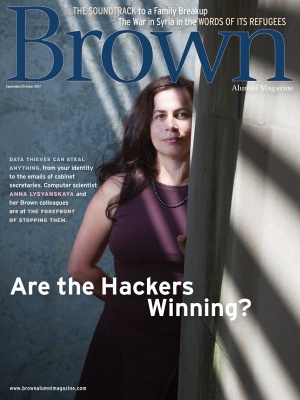As an undergraduate, I was drawn to the field of economics when I saw how data, applied to economic theory, could illuminate real human problems and inform policy solutions. Economic research has evolved since that time. Today’s vast datasets and sophisticated data analytics have transformed the field and created powerful new approaches.

The data revolution has brought about a paradigm shift in discovery and scholarship not only to economics, but to the physical and biological sciences, the social sciences, and the humanities. Recognizing this, a cross-disciplinary group of faculty experts at Brown came together a little more than a year ago to develop a data science hub that could pioneer new modes of data-enabled learning. When the Data Science Initiative (DSI) formally launched in mid-September, the value of “big data” was touted as both a centerpiece of academic programming and a driver of innovation.
Building on Brown’s longstanding strengths in math, applied math, computer science, and biostatistics, the DSI is already prompting novel research in such affiliated units as the Institute at Brown for Environment and Society and the Brown Institute for Brain Science. And it is engaging external partners and alumni around student capstone projects.
But the DSI’s most enduring contribution may well be how it expands the way we educate. Like all things at Brown, it is firmly grounded in the liberal arts, whose power lies in their integrative approach, in how they broaden the “ways we know.” To fully tap that power, the DSI is refining data science practice, by strengthening computational methods and coordinating informatics pipelines and data resources.
In turn, this is generating data-enabled inquiry across disciplines. Brown sociologist Scott Frickel, for example, has developed a data-mining method for extracting tabulated, geocoded data from phone books; with it he is building a comprehensive dataset for land use in greater Providence, allowing him to test theories of land use transformation.
To help explain the rise of political polarization in America, economist Jesse Shapiro used natural language-processing algorithms to demonstrate increasing differences in the words spoken by Republican and Democratic members of Congress. And music faculty members are using machine learning tools to respond to improvised music, extract elements, and develop new instruments electronically. In each case, the ways we know—probing urban-scale spatial processes, discerning the functional range of language, and creating new forms of music—are amplified. And our grasp of what it means to conduct research is altered.
Brown’s approach to education in data science goes beyond teaching the methods and tools of data analysis. Students are asked to think critically about big data from ethical and societal perspectives. This approach—integrating rigorous training in foundational methods and applications with a deep understanding of how the data revolution is affecting society, culture, and social justice—distinguishes the DSI from programs at peer institutions.
For Brown, an important question was how to frame digital fluency and data savviness as core competencies for leadership, innovation, and civic engagement. At our Rhode Island Innovative Policy Lab faculty and students analyze government and industry data to examine social policy on such issues as educational achievement, workforce training, and nutrition; they can then design new policies to improve outcomes at lower cost. Fittingly, our leadership in this area was recognized recently with a Transdisciplinary Research in Principles of Data Science grant from the National Science Foundation.
When I speak with alumni and others who want to hire data-savvy college graduates, they tell me that outstanding technical skills aren’t enough. They also want employees with a broad perspective, who know how to work collaboratively to solve problems in creative ways.
And that is exactly what Brown delivers.




